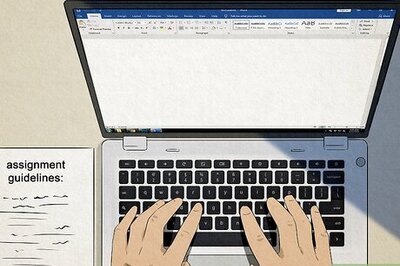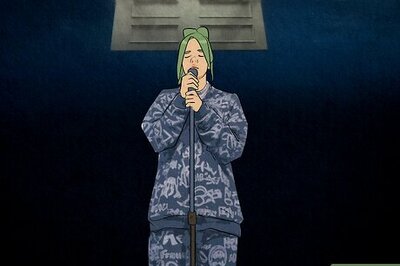
views
New Delhi: Civil Society was never thought to be outside of the three pillars under the Constitution. We now have Civil Society by the name of the fourth pillar - with no answerability or accountability to anyone. A prime instance is as under, where the Justice PB Sawant (Former Judge, Supreme Court of India) Commission appointed by the Government of Maharashtra under the Commissions of Inquiry Act, 1952 on 1st September, 2003 submitted its report on 23rd February, 2005 while indicting four persons for corruption- Sureshdada Jain, Minister (Food and Civil Supplies), Nawab Malik, MOS (Housing), Padmasinh Patil, Minister (Irrigation) Maharashtra and Anna Hazare. The law is meant to have an equal effect on all persons. All persons are equally liable to face punishment if they have performed an act of corruption.
However, a stark difference is noted in the manner in which the three ministers resigned from the Cabinet and were shamed. Anna Hazare, who did not hold any public office, but was equally indicted for corruption moved from strength to strength, he is today known as India's foremost crusader against corruption. This alone demonstrates that 'Civil Society' which often accuse government functionaries of corruption wears an armour in the eyes of the general public and is therefore free from all charges. This nature of extra-constitutionalism was noted by the Sawant Commission which noted the manner in which Hazare had arm-twisted the Government of Maharashtra to appoint the Sawant Commission:
"The agitational (sic) activities have however to be carried on by observing certain norms. Not only have they to be peaceful, but also legal. A care has also to be taken to see that they do not lead to anti-social activities or become extra-constitutional centres of power. Such a development will itself encourage lawlessness and spell out the end of the rule of law. The mode of agitation has further to vary according to its object and the social conditions obtaining at the time. Else, it will not only achieve its object but will prove counter-productive. It has to be remembered that the agitational (sic) activities also constitute a social power, which is as much liable to be abused as the political power. When the social power is used irresponsibly, or to subvert the constitutional authority, it is hardly distinguishable from terror… (Page 22)." Shri Hazare proposes to hold a fast on August 16th to compel the Central Government to accept his version of the Jan Lokpal Bill.
The Commission further commented on the means adopted by Hazare to attack the 'corrupt,' who on a mere allegation by Hazare gain notoriety. ".. As the present inquiry reveals, while making the allegations of corruption the complainant Shri Hazare relies exclusively on the information supplied to him by his workers or so on the contents of the representations made to him by the discontented. The information thus made available may not all be disinterested and may be motivated by various considerations, including personal, political and corrupt. In any case, such information coming from whatever source it may, has to be verified at least by giving an opportunity to the person against whom the complaint is made. This is an elementary precaution, which has to be taken before making the individual a target of agitation.
As has been admitted by Shri Hazare, the persons against whom he receives complaints are not even intimated by him about them. They have, therefore, no opportunity to reply to the charges in the complaints. Shri Hazare gave two reasons for dispensing with the said basic requirement viz. that his Andolan has no funds to call for the explanations from the concerned individuals, and secondly, his team of lawyers clears the complaints before the agitation is started. The first reason is both strange and indefencible, while the second is as much unjustified. If the movement against corruption, which he has started, does not have sufficient funds even for postal correspondence with the persons concerned, certainly he cannot make the targeted individuals suffer on that account. It is further not his case that even his lawyers give an opportunity to the persons concerned to explain the charges against them before they clear the complaints for agitation.
It must be realised that when persons like Shri Hazare who have come to be respected by the society on account of their laudable work in other fields, publicly accuse any person for his misdemeanour, the people come to believe it intrinsically, and the person concerned earns a social odium for life-time, even if later he comes to be cleared of the charges. There have been cases where persons have been victimised either by public or private complaints, at the strategic moments in their life and career. The blackmailers, in particular, take advantage of such situation. The adequate provisions, which even otherwise are a must, become all the more necessary in such movements. The social power should not become or allowed to become an engine of oppression of the innocent. (Page 24)" Despite this serious noting, Shri Hazare trained his guns on Sharad Pawar, making unfounded allegations against him and forcing his resignation from the team of Ministers to hold parleys with Team Anna. Team Anna has since made statements against MP's and Hazare has recently stated that the remote control was preventing the PM from coming under the ambit of a Lokpal. He has also made comments about the PM's foreign education coming in the way of his understanding of India.
Anna Hazare was indicted on charges of committing a corrupt practice. The Commission noted: "As regards the allegation that the funds belonging to the Trust were spent for celebrating the 60th birth anniversary of Shri Hazare, we find that there is no valid defence of the Trust to the said allegation. Admittedly, an amount of about Rs. 2.20 lakh was spent in the year 1998-99 when Shri Hazare was felicitated on his birthday. Shri Abhay Firodia, a businessman gifted an equivalent amount to the trust subsequently. A defence was sought to be raised that since the entire amount spent for the birthday was received by the trust subsequently, the trust cannot be said to have spent any of its funds for the birthday celebrations. The defence is deceptive. In the first instance, the amount received from Shri Abhay Firodia many days after it was spent for the birthday celebrations.
Secondly Shri Abhay Firodia gave the said amount as "donation" to the Trust. Therefore, even that amount belonged to the Trust and no amount belonging to the trust could have been spent for the purpose concerned….. We wish that such an argument was not advanced. This is obviously an illegal utilisation of the trust's funds. It may further be noted that the trust has obtained a certificate of exemption from the Income Tax Department to the donors, for the donations made by them to it. Shri Abhay Firodia must have earned the requisite benefit in his tax liability, for the said donation. (Page 270-271)" "…The expenditure of Rs 2.20 lakh from the funds of the Hind Swaraj Trust for the birthday celebrations of Shri Hazare was clearly illegal and amounted to a corrupt practice. Page 365". This trend of building a personality cult continues to this day if a statement that appeared in the Hindu on 9th April, 2011 after Shri Hazare's fast is read in this context: "Anna is expected to reach here in the next few days. We have planned a grand welcome for him. A victory procession will be organised," Datta Awari, who handles Mr Hazare's office at the village, said." It is alleged that an extraordinary procession took Hazare to his native village with several lakhs spent on the event.
Mr Hazare, besides being indicted above on corruption, has also been indicted by the Commission on 23 counts of 'maladministration', which the Commission defined, as "Corruption is only a species of maladministration, which besides corruption, consists of the negligence, the lack of supervision, carelessness and waste and inefficiency, among others. Broadly speaking, the improper conduct of the affairs of a public institution, adversely affecting the interests of the public or the beneficiaries will amount to maladministration." and 9 counts of illegality-some of them are mentioned as hereunder:
"Although Shri Hazare was not qualified to remain a member of the Society during the period 2001 to 2003 since he did not hold any land within the jurisdiction of the Society during that period, he continued to be the Chairman of the (Krishna Pani Puravatha Yojana Sahakari Sanstha) Society. This was patently illegal. (Page 371)"
The Commission also concluded that the Bhrashtachar Virodhi Jan Andolan Trust was not even registered legally as a Society under the Societies Registration Act. The Commission held this to be an act of maladministration. The Commission held "the Andolan could not act as a Trust legally after 1998, since it did not have the minimum number of trustees, according to the trust deed, to operate as the Trust. It also did not have the minimum number of trustees to form the quorum since October 1999. All the acts of the Andolan as the Trust after 1998 were, therefore illegal. There was thus a patent maladministration in the functioning of the Trust. (Page 368-369)" Further Shri Hazare appointed District Committees after 1998 (when the Andolan was not even registered legally). Further, the receipt books of these committees were lost, this was noted to be a "patent maladministration" Page 370). Despite the fact that the Andolan was not even registered, Shri Hazare's cohorts let loose a reign of terror for purposes of extortion, to which the Commission noted " Some of the workers in the Andolan were abusing the platform of the Andolan for anti-social activities, such as, extortion of money, blackmailing, grabbing the properties of others, harassment, goondaism, corruption etc. Although Shri Hazare denied that some of them were his workers, he could not deny that the others at least were his own workers. These acts on their part were clearly criminal. When the complaints were made against some of them, Shri Hazare did not care to investigate them, and when he did inquire into some of them, he only heard his own workers without calling the complainants for the inquiry. This was highly unjust and irregular and amounted to patent maladministration (Page 370-371)".
The Commission also noted, “The amount of 46,374 spent on the renovation of the Yadav Baba was contrary to the objects of the Trust. The amount would be spent only on education and that secular education. Both the objects were defied by the said expenses incurred on renovation of Yadav Baba temple and therefore constituted illegalities (Page 367)." Further, the same trust was found to have committed an illegality in submitting its accounts for 12 years, between 1982 and 1994 in one go on 31.3.1995 and again in submitting its accounts for 1995-2002 only on 29.07.2003. The Commission held "Since the accounts of all the divisions of the Trust were not consolidated and submitted to the Charity Commissioner for some of the years as pointed out above, the Trust was guilty of maladministration. (Page 367)"
Some other serious improprieties include "Shri Hazare has not explained as to why a separate joint account in his name and in the name of one Dadgu Kisan Mapari was kept in the Adarsha Gramin Bigarsheti Sahakari Patsanstha. This amounts to a clear irregularity, as is, therefore an act of maladministration. (Page 368)"
Article by Brijesh Kalappa, Supreme Court Advocate and Additional Advocate General of Haryana.




















Comments
0 comment